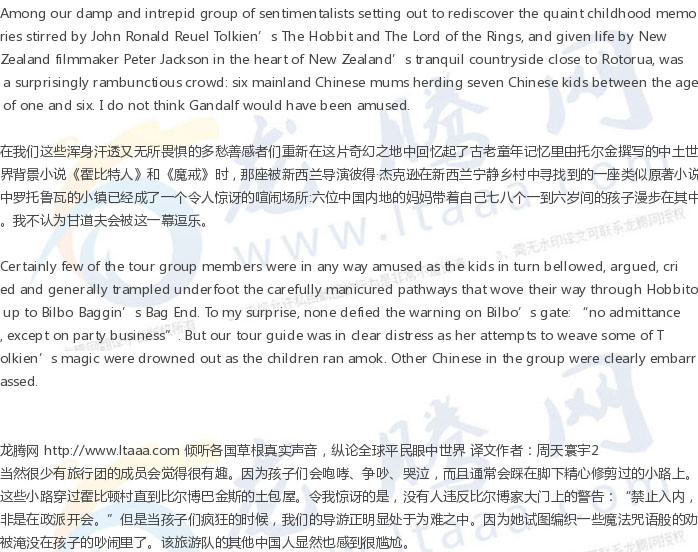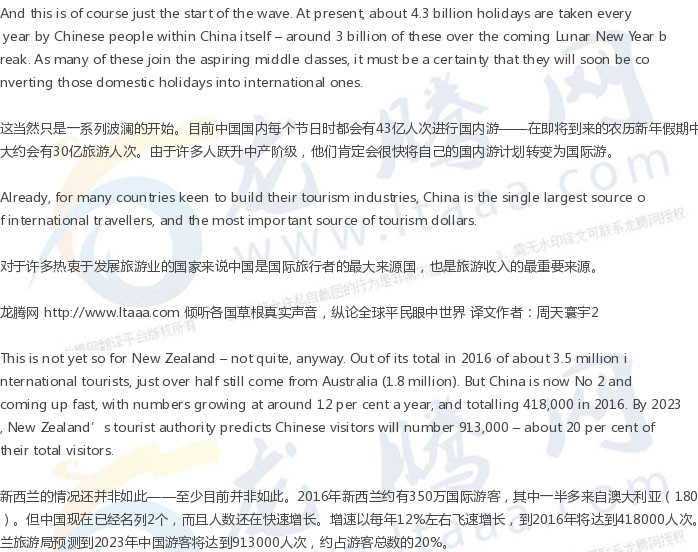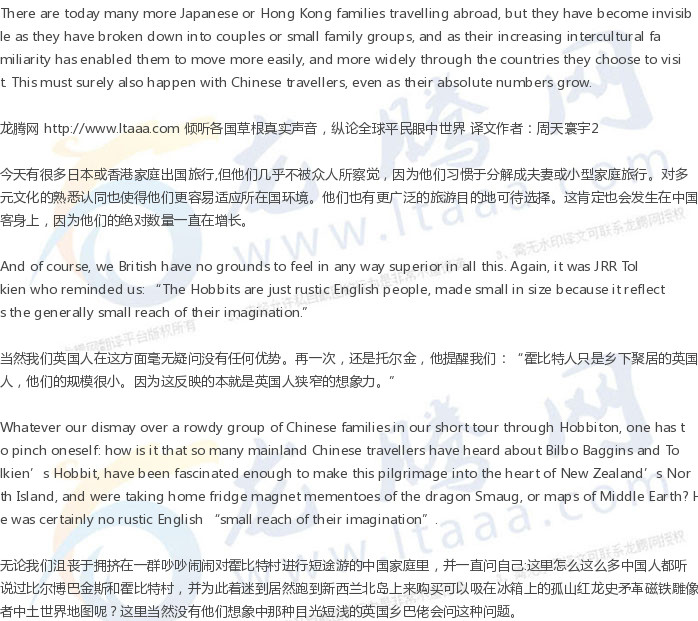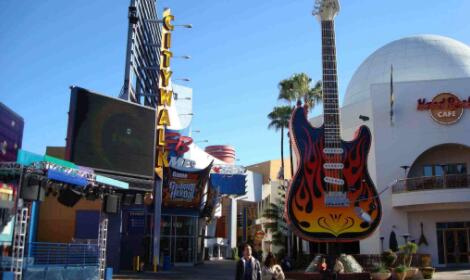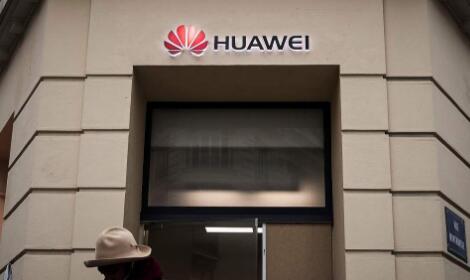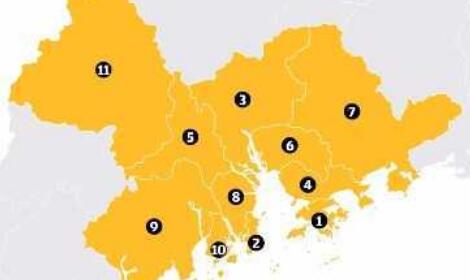为中国旅游热潮做好准备 [联合国媒体]
中国国际游客每年在旅游上花费约为1610亿美元。随着这个数字的增长全球越来越多的经济体持续渴望获得更多中国游客份额。
Get ready for the huge Chinese tourism boom
为中国旅游热潮做好准备
China’s international tourists spend around US$161bn a year on travel, and as this number grows, so an increasing number of economies worldwide will remain eager to capture their share
中国国际游客每年在旅游上花费约为1610亿美元。随着这个数字的增长全球越来越多的经济体持续渴望获得更多中国游客份额。
As we queued to climb onto the little tourist bus readying to take us down into Hobbiton, the secret and mystical valley home of Bilbo Baggins and his fellow hobbits, there was already a sense of foreboding. And no, it did not come from the glowering rain clouds hovering close overhead.
当我们排队爬上一辆准备把我们带到霍比特人村的小旅游巴士时,村庄已经有一种预感了。比尔博巴金斯和他的霍比特人就秘密居住在这片神秘山谷中。这种预感并不是来自于头顶上空盘旋着的雨云。
Is this the shape of “tourism future”, not just in mythical places like Hobbiton in New Zealand, but worldwide, as unprecedented millions of mainland China’s newly empowered middle class families prepare to discover the globe? How prescient was Tolkien to note, as Bilbo was about to begin his adventure across Middle Earth, to the Lonely Mountain and the home of Smaug the dragon: “It is a dangerous business going out of your front door.”
这将是新西兰“未来旅游业”的情况,不仅仅是在像新西兰霍比特人村这样神话般的地方,而是在世界范围内。因为中国大陆数百万新崛起的中产阶级家庭正准备探索世界。当比尔博即将开始他在中土世界的冒险之旅,奔赴孤山和巨龙斯矛革之家时他有先见之明地说出:“从你家前门走出去是一件危险的事。”
As in other areas, China’s laws of big numbers are transforming the world of tourism, and not just in New Zealand. The Germany-based China Outbound Research Institute calculates that more than 150 million mainland Chinese travellers ventured overseas last year – the largest number from any nation. And this is predicted to grow beyond 200 million annually in the next five years. Admittedly, 68 million of the present total were travelling to Hong Kong and Taiwan, but that still meant 83 million travelled more intrepidly – outnumbering the 83 million German overseas travellers, and the 68 million from the US.
就像在其他领域一样,中国人在海外旅游时产生的大量司法事件正在改变全球旅游业,而不仅仅在新西兰。总部位于德国的中国对外研究机构估计去年有超过1亿5千万中国大陆游客在海外行走,这在所有国家中人数都最多。预计在未来五年内这一数字将超过2亿。诚然目前共有6800万人前往香港和台湾,但这仍意味着8300万人次旅行规模很有意义——至少超过了8300万德国海外游客人次,以及美国6800万人海外旅游人次。
Perhaps more important, Chinese visitors are predicted by 2023 to be the country’s most important source of tourism dollars because, perhaps surprisingly, they are among the world’s highest-spending travellers. New Zealand’s tourism officials say Chinese visitors spend an average of NZ$297 (US$215.50) a day, compared with NZ$240 among US travellers, NZ$223 among Japanese, and a comparatively miserly NZ$130 among British visitors.
也许更重要的是,到2023年中国游客将成为该国最重要的旅游收入来源国。因为他们是世界上消费最高的游客之一。新西兰旅游局官员称中国游客平均每天花费297新西兰元(合215.50美元),相比之下美国游客只有240新西兰元,日本游客223为新西兰元。英国游客则相对吝啬。只有130新西兰元。
China’s international tourists today spend around US$161 billion a year on their travels, and as this number grows, so an increasing number of economies worldwide will remain eager to capture their share – even if significant stresses arise as they try to manage the flows.
如今中国国际游客每年在旅游上花费约为1610亿美元。随着这一数字不断增长世界各地越来越多的经济体将继续渴望更多中国游客到来——即使在他们试图管理资金流动时会面临重大压力。
At present, a majority of mainland travellers are moving as part of large tour groups, but as the free individual traveller category of traveller grows and as more mainland cities are allowed to issue individual travel visas, so the awkward lumpy impact of these travellers can be expected to lessen.
目前大多数大陆游客都参团大型旅游团。但随着选择自由行的人越来越多,越来越多内地城市被允许签发个人旅行签证,因此过去这些旅行者在寻求签证时遭遇的尴尬等受不稳定因素影响可能会减少。
In Hobbiton, it was fascinating to observe the embarrassment of the numerous individual Chinese tourists – most of them young, English-speaking, and sporting the latest iPhones – as they watched the uncouth impact of their fellow countrymen.
在霍比顿村,看到众多中国游客的到来我们很开心——他们大多是年轻会说英语的人,还用着最新iphone——他们也注意到了同胞们不礼貌行为带来的影响。
And as I too wrestled to listen to our intrepid tour guide, I was reminded first that it was unfair to racially stereotype: kids aged one to five in numbers can without doubt be uncouth and uncontrollable from any number of countries and cultures – especially to fusty oldies like me.
我也在在喧闹环境搏斗时也听到了我们导游的话。这让我想起了第一次出境游时遭遇的不公平种族刻板印象:任何国家文化背景的1 - 5岁孩子行动都不受自己完全控制,特别像我这样的老派人看来。
And second, I was reminded of those large, noisy groups of Japanese tourists that Londoners complained about in the 1960s, and thoseHong Kong tourists being herded into tourist trinket shops in Thailand or Paris in the 1970s. All came and went.
其次我想起了上世纪60年代伦敦人抱怨那些大吵大闹的日本游客。以及上世纪70年代那些香港游客被导游赶进泰国或巴黎的旅游小饰品店。所有人来了又走一去不复返。
Perhaps this can all be for the good. Remember Tolkien’s sage words: “Not all of those who wonder are lost.” I can quaff a glass of ale to that with Chinese friends in Hobbiton’s Green Dragon pub.
也许这一切都是好的。记住,托尔金也说过:“不是所有人都沉迷于自我放逐。”“我完全可以和中国朋友在霍比特村绿龙酒吧里分享一杯啤酒。”
版权声明
我们致力于传递世界各地老百姓最真实、最直接、最详尽的对中国的看法
【版权与免责声明】如发现内容存在版权问题,烦请提供相关信息发邮件,
我们将及时沟通与处理。本站内容除非来源注明五毛网,否则均为网友转载,涉及言论、版权与本站无关。
本文仅代表作者观点,不代表本站立场。
本文来自网络,如有侵权及时联系本网站。
图文文章RECOMMEND
热门文章HOT NEWS
-
1
他们认为,协商失败的峰会实际上符合中国的利益,而且北京的影响力将增加,因...
- 2
- 3
- 4
- 5
- 6
- 7
- 8
- 9
- 10
推荐文章HOT NEWS
-
1
这是中国中部河南省郑州的一个普通的星期六。富士康工厂大楼上空笼罩着...
- 2
- 3
- 4
- 5
- 6
- 7
- 8
- 9
- 10

